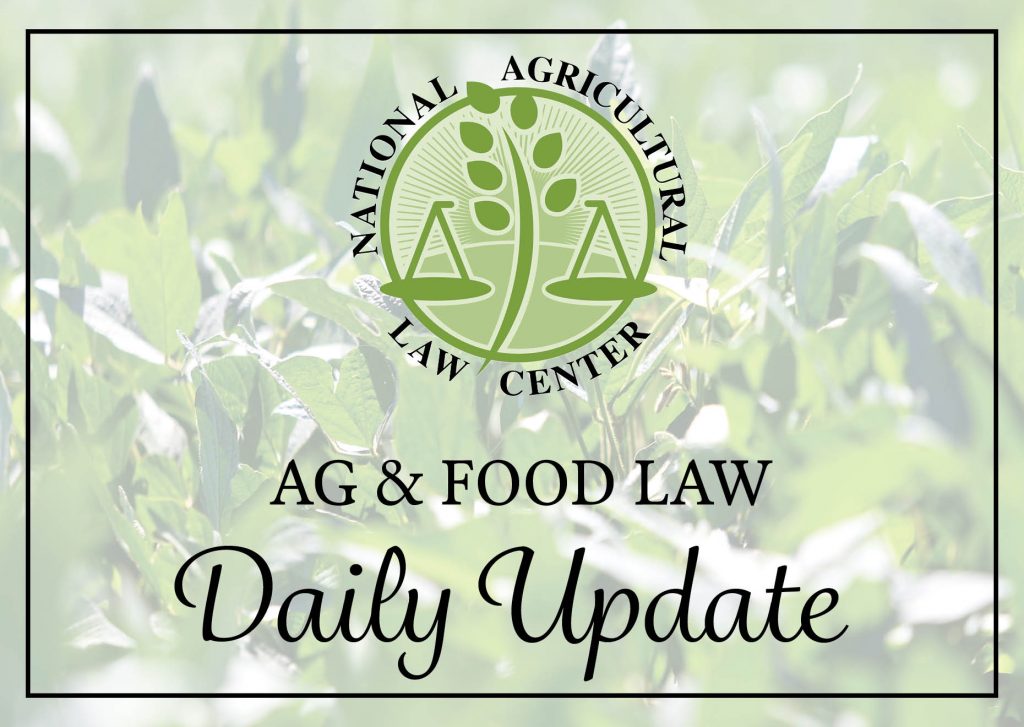A comprehensive summary of today’s judicial, legislative, and regulatory developments in agriculture and food. Email important additions HERE.
JUDICIAL: Includes ESA, water law, environmental law
In The Klamath Tribes v. U.S. Bureau of Reclamation, No. 1:21-CV-00556, 2021 WL 1819695 (D. Or. May 6, 2021), the District Court of Oregon considered whether to grant the plaintiff’s request for preliminary injunction in a lawsuit alleging that the Bureau of Reclamation (“the Bureau”) has violated the Endangered Species Act (“ESA”) by failing to comply with the terms of its Incidental Take Statement (“ITS”). Ultimately, the court declined to grant the preliminary injunction because it found that the plaintiff’s claim was unlikely to succeed on the merits. The dispute at the heart of this case centers around water use in the Klamath Basin, located in Southern Oregon and Northern California. The plaintiff is a federally recognized tribe consisting of people who have traditionally inhabited the Klamath Basin. For decades, the issue of water usage in the Klamath Basin has lead to conflict between the Klamath Tribe, farmers, and government agencies. In this lawsuit, the plaintiff alleges that the Bureau is currently releasing the water from the Upper Klamath Lake (“Lake”) at a rate which is detrimental to threatened and endangered fish populations without having properly consulted with the Fish and Wildlife Service (“FWS”). The plaintiff has asked the court to issue a preliminary injunction limiting the amount of water that the Bureau releases from the Lake while the issue is litigated.
For a court to grant a preliminary injunction, the party who requests it must show that they are likely to succeed on the merits of their underlying claim. In order to get a preliminary injunction, the plaintiff here must show that it is likely to succeed on the merits of its claim that the Bureau has failed to comply with the ESA. The Bureau is currently regulating water flow from the Lake according to an Interim Operation Plan (“Interim Plan”). According to the ESA, the Bureau consulted with FWS as to the effects of the Interim Plan on threatened and endangered species. That consultation resulted in a Biological Opinion published in April, 2020 (“2020 BiOp”), which concluded that the Interim Plan would not jeopardize any listed species so long as water levels in the Lake remain above a certain level. Due to extreme drought, the water in the Lake has dipped below those levels. According to the 2020 BiOp, if maintaining the Lake at the specified level became impossible, the Bureau would be required to reinitiate consultation with FWS. The plaintiff alleges that the Bureau has failed to reinitiate consultation. However, the Bureau alleges that it has both engaged in informal consultation with FWS to develop Temporary Operating Procedures, and has reinitiated the formal consultation process with FWS which is scheduled to conclude in 2022. Because the court believes these actions satisfy the requirements of the 2020 BiOp, it has denied the plaintiff’s motion for preliminary injunction on the basis that the plaintiff has failed to show that it is likely to succeed on the merits of its claim that the Bureau has violated the ESA.
REGULATORY: FWS, NOAA
Fish and Wildlife Service
Notice announcing the availability of our draft recovery plan for Kuenzler hedgehog cactus, a small cactus found in New Mexico. Kuenzler hedgehog cactus is listed as threatened under the Endangered Species Act. Info here.
National Oceanic and Atmospheric Administration
Final rule removing the regulatory restriction that limits processing of squids and sculpins to fishmeal only. This final rule is necessary to allow the processing and sale of squids and sculpins as products other than fishmeal and thereby to help prevent waste of the incidental catch of these ecosystem component species. Info here.
Temporary rule announcing the closure of the Northern Gulf of Maine Scallop Management Area for the remainder of the 2021 fishing year for Limited Access General Category vessels. Info here.
Final rule implementing Amendment 12 to the Fishery Management Plan for the Dolphin and Wahoo Fishery of the Atlantic, as prepared and submitted by the South Atlantic Fishery Management Council. Info here.
